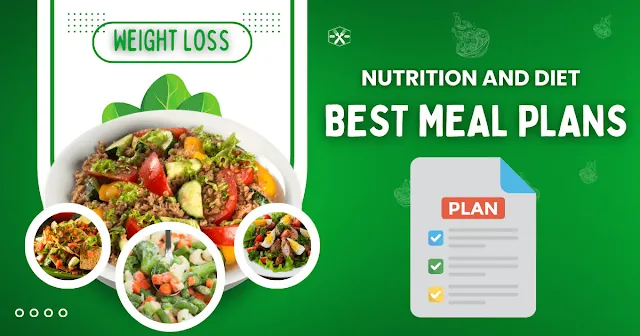Nutrition and Diet: How to Choose the Best Meal Plans for Weight Loss
Introduction
- If you are looking for a way to lose weight, you might be overwhelmed by the number of diet programs and meal plans available. How do you know which one is right for you? How do you balance your nutrition and health goals with your food preferences and budget? In this article, we will explore some of the most popular meal plans for weight loss, such as the keto diet plan, and give you some tips on how to choose the best one for your needs.
What are meal plans for weight loss?
Meal plans for weight loss are structured eating patterns that help you control your calorie intake and macronutrient ratios. They usually provide you with a list of foods to eat, portion sizes, and meal timings. Some meal plans also include recipes, shopping lists, and online support.
Meal plans can vary in their duration, flexibility, and level of restriction. Some are designed to help you lose weight quickly, while others are more sustainable and long-term.
Why use meal plans for weight loss?
Meal plans for weight loss can have several benefits, such as:
- They can help you create a calorie deficit, which is essential for weight loss.
- They can help you optimize your macronutrient intake, which can affect your metabolism, appetite, and body composition.
- They can help you avoid unhealthy foods and habits, such as binge eating, snacking, and emotional eating.
- They can help you save time and money by reducing the need for planning, cooking, and shopping.
- They can help you stay motivated and accountable by providing you with clear guidelines and feedback.
What are some of the most popular meal plans for weight loss?
There are many meal plans for weight loss available, but some of the most popular ones are:
- Keto diet plan: This is a low-carb, high-fat, moderate-protein diet that aims to put your body into a state of ketosis, where it burns fat instead of glucose for energy. The keto diet plan can help you lose weight quickly, suppress your appetite, and improve your blood sugar and cholesterol levels.
However, it can also cause side effects such as keto flu, constipation, bad breath, and nutrient deficiencies. The keto diet plan is not suitable for everyone, especially people with diabetes, kidney disease, or heart disease.
High protein foods for weight loss
Fueling Fat Loss: The Power of Protein Powder in Your Weight Management Journey
Diet plan for weight loss
How to choose the best meal plans for weight loss?
- Your current weight and health status
- Your weight loss goal and timeline
- Your dietary preferences and restrictions
- Your budget and availability of resources
- Your level of commitment and motivation
To choose the best Food plans for weight loss, you should:
- Consult your doctor before starting any new diet program or making any drastic changes to your eating habits.
- Do your research on the pros and cons of different meal plans and compare them based on your criteria.
- Start with a trial period of a few weeks or months to see how you like the meal plan and how it affects your weight loss progress.
- Monitor your results and adjust your dietary plan accordingly if needed.
- Seek professional guidance from a nutritionist or a dietitian if you have any questions or concerns.
Diet articles for students: High Protein Foods for Weight Loss
- Plan your meals in advance and make a shopping list based on the ingredients you need. This can help you avoid impulse buying and food waste.
- Choose foods from different food groups, such as fruits, vegetables, whole grains, lean protein, and low-fat dairy. These foods provide a variety of nutrients that support your health and immune system.
- Cook in bulk and freeze the leftovers for later. You can also use leftovers to create new dishes, such as salads, sandwiches, or soups.
- Look for discounts, coupons, and sales on healthy foods at your local supermarket or online. You can also buy frozen or canned fruits and vegetables, which are cheaper and last longer than fresh ones.
- Limit your intake of processed foods, fast foods, sugary drinks, and alcohol. These foods are high in calories, fat, sugar, and salt, but low in nutrients. They can also harm your health and well-being in the long term.
Vegan protein
Vegan protein is a protein that comes exclusively from plant sources, such as pulses, tofu, quinoa, nuts, seeds, grains, and vegetables. Vegan protein is essential for building and maintaining muscles, skin, organs, hair, and nails, as well as supporting the immune system and blood sugar regulation. Vegan protein also provides a range of vitamins and minerals, such as zinc and B vitamins.
To get all the essential amino acids that the body cannot make on its own, vegans need to combine different plant foods, such as beans and rice, or tofu and broccoli. A varied and balanced vegan diet can provide enough protein for optimal health and well-being.
Conclusion
Meal plans for weight loss can be a useful tool to help you achieve your nutrition and health goals. However, they are not magic bullets that guarantee success.
You still need to follow the basic principles of healthy eating, such as eating whole foods, limiting processed foods, drinking enough water, and practicing moderation.
You also need to combine your meal plan with regular physical activity, adequate sleep, and stress management. Remember that losing weight is not only about what you eat but also about how you live.

